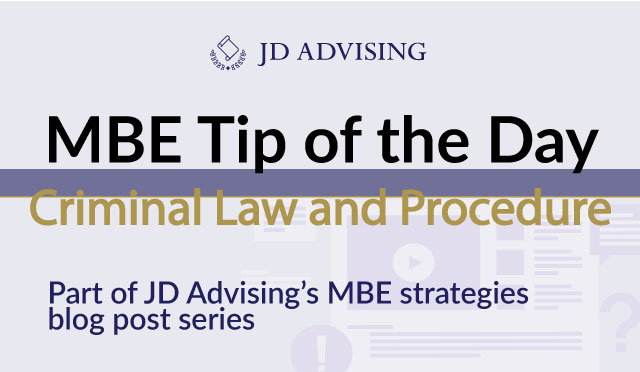Criminal Law MBE Tip of the Day!
MBE Tip of the Day: Criminal Law
Welcome to our MBE tip of the day series. This post focuses on a Criminal Law MBE tip! You will see 25 scored Criminal Law/Procedure MBE questions on the Multistate Bar Exam. About half will focus on Criminal Law while half will focus on Criminal Procedure.
In this post, we will review a Criminal Law MBE question together. Note that we have posted several MBE tips (which you can find links to at the bottom of this post) that focus on a specific multiple-choice question that many students answer incorrectly. If you can master these questions, it could increase your MBE score by that many points if you see any of these issues tested again (which, by the way, you will!). These posts of MBE tips and tricks will not only cover substantive law but also strategy. So each “MBE tip of the day” post covers one highly-tested area of substantive law as well as an important MBE strategy. You can sign up to receive these posts directly to your inbox for the upcoming administration at the bottom of this page.
MBE Tip of the Day Instructions:
Do your best to answer this Criminal Law MBE question (before even looking at the answer choices and before looking at the answer below).
Ask yourself: What is the subject? What is the legal issue? What is the rule and analysis? What is the conclusion? Try to answer these beginning questions before even reading the answer choices. Then, uncover the answer and read more about our MBE tip of the day.
Show the MBE Question...
Criminal Law MBE Question
A man walked into a convenience store and immediately approached the cashier. He yelled, “Give me all your money or I will shoot you!” The man had his hand in his pocket with his finger pointed like a gun and shook it at the cashier. However, there was no gun in his pocket. Feeling scared, the cashier tripped the alarm and when the man heard it, he ran out of the store, empty-handed. The man’s friend was waiting for the man outside the store to serve as the getaway driver. As soon as the man ran out of the store, he quickly got into his friend’s car, and the friend drove away from the scene in order to avoid being caught.
What crime is the man’s friend liable for?
(A) Robbery.
(B) Attempted Robbery.
(C) Larceny.
(D) No crime.
Subject:
Legal Issue:
Legal Rule and Analysis:
Choose an answer choice that most closely matches your conclusion and explain why the others are incorrect:
Show the Answer to the MBE Question...
Answer to the Criminal Law MBE Question
Subject: Criminal Law
Legal Issue: What crime is the man’s friend liable for? (Note: Make sure you are reading the question carefully — this question is specifically asking about the man’s friend, rather than the man.)
Legal Rule and Analysis: This question expects you to know the rules for larceny, robbery, and accomplice liability as well as basic principles of attempt. A lot of Criminal Law questions that focus on specific crimes expect you to simply apply the rule — so you have to know the rules well!
- Larceny is the trespassory taking and carrying away of personal property of another with the intent to permanently deprive them thereof.
- Robbery is a larceny where the taking occurred from the other’s person or presence combined with force or the threat of force. It is immaterial whether the defendant can actually follow through with his threat, as long as the victim feels fear or if force is used.
- Note: In some states, the taking does not actually have to be completed for the accused to be guilty of robbery. However, for MBE purposes, there must be a completed taking! Otherwise, there is only an attempt to commit a robbery.
- For purposes of accomplice liability, an accomplice is a person who assists or encourages the principal with the intent that the crime is committed. Accomplices are liable for all crimes that they aided or encouraged, as well as all natural and probable results of the crime that the accomplice intended to assist. Getaway drivers are considered accomplices, as long as they had the specific intent that the crime is committed.
In this problem, the man did not actually complete the taking. Therefore, while he meets the requirements for robbery in some states, he is not liable for robbery for MBE purposes. He would merely be liable for attempted robbery. (An attempted robbery is present because he had the specific intent to commit the crime and he completed all of the actions necessary–he simply did not recover any money!)
The getaway driver will be liable for the same crime(s) that the man is liable for since he assisted the principal with the intent that the crime is committed. He will be liable under a theory of accomplice liability. Thus, because the man is liable for attempted robbery, the friend will be as well.
Conclusion: The man’s friend is liable for attempted robbery.
Look at the answer choices provided. Choose an answer choice that matches your conclusion. Review the other answer choices provided. The answer choice (B) is therefore correct. (A) is incorrect because the man did not complete the taking and cannot be liable for robbery. Thus, neither can his friend. (C) is incorrect because there was no completed taking so larceny has not been committed. (D) is incorrect because the man’s friend acted as a getaway driver with the intent to assist the crime so he is liable for the same crime(s) that the man is liable for.
MBE Tip: Remember your state vs. MBE distinctions! It is important to find ways to distinguish the law that will be applied in your individual state (if you’re in a non-UBE jurisdiction) and the law that will be applied on the MBE. For example, a Michigan bar exam taker who was applying Michigan law might have selected answer choice B since robbery in Michigan does not require a completed taking. While you’re studying for the bar exam, make sure you are compartmentalizing the information. If you are making your own flashcards, outlines, or other study materials, try using different colors for the law that applies only in your state. On the day of the MBE, don’t let any of your state’s distinctions distract you from the correct answer!
Show Summary of the Two Key Takeaway Points for the Day
Key Takeaways and MBE tips from prior posts
Takeaway for the Law: To be liable for robbery, one must complete the taking for the purposes of the MBE. To be liable as an accomplice, one must have the specific intent that the crime be committed.
Criminal Law MBE Tip: Make sure to keep your state law distinctions separate from the law that you apply on the MBE!
Want to See Past MBE Tip of the Day Posts?
If you would like to see “MBE tip of the day” posts from prior days, please check out all of our past MBE tip of the day archives here! We have several of them and we list them by subject!
Looking for additional MBE help?
If you are looking for MBE help, read our 10 expert MBE tips here. Check out our step-by-step guide to improving your MBE score, please review this post for an overview of tips. If you would like to have the next MBE tip emailed to you when we come out with another one, please fill out the form below.
MBE Tip of the Day
Seeking MBE Assistance?
Seeking MBE Assistance?
- 📘 MBE Guide: Equip yourself with our FREE expert-crafted bar exam and MBE guides.
- Free Bar Exam Resource Center: Discover top resources, articles, and free webinars led by renowned bar exam professionals.
Top Resources as Vouched by our Students:
- MBE One-Sheets: One of our most highly acclaimed bar exam supplements!
- Bar Exam Outlines: Our comprehensive and condensed bar exam outlines present key information in an organized, easy-to-digest layout.
- MBE Private Tutoring: Opt for personalized, effective strategies.
- On Demand Bar Exam Course: Comprehensive bar exam preparation.
- Bar Exam Crash Course and Mini Outlines: Acclaimed and effective for a quick refresher.
- MBE Mastery Class, Real MBE Questions, and MBE Guide: Elevate your MBE preparation with these high-quality MBE supplements!
🔥 NEW! Check out our Repeat Taker Bar Exam Course and get introduced to our unmatched platinum Guarantee Pass Program.






